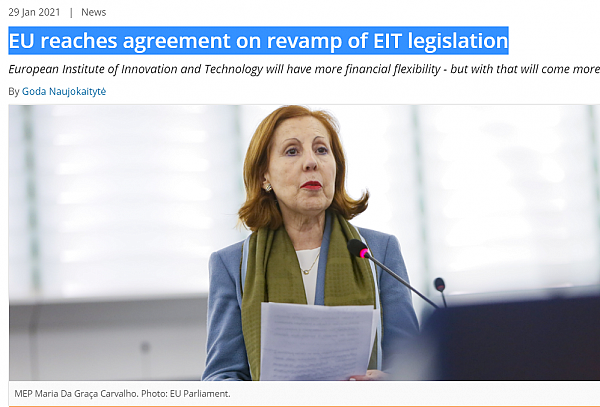Imprensa EU reaches agreement on revamp of EIT legislation
EU policymakers have reached agreement on changing the legal footings of the EU’s innovation agency, the European Institute of Innovation and Technology (EIT), giving public-private partnerships more control over their own budgets. The deal also sets EIT’s priorities for the next seven years.
“Together we make the EIT stronger [and] give it the means to develop its full potential,” tweeted EU research commissioner, Mariya Gabriel.
After a year and a half of talks, EIT emerges with a budget of €2.96 billion for the next seven years as part of the EU’s next research programme, Horizon Europe.
The new legislation gives EIT’s Knowledge and Innovation Communities (KICs), large-scale partnerships between higher education, business and research organisations, more flexibility and control over their funding.
Current annual grants will be replaced by multi-annual agreements, enabling the communities to plan long-term and reducing bureaucracy.
“After visiting a number of KICs in my home country, the Netherlands, I discovered the current yearly model has been burdensome and impractical for the KICs. We have taken steps to lower the administrative burden,” said Rob Roos, the Parliament’s Eurosceptic group’s shadow rapporteur.
More flexibility over funding and content will also enable KICs to better respond to crises, such as the COVID-19 pandemic. After the health crisis broke out last year, “We thought we could not continue business as usual,” said Maria da Graça Carvalho MEP.
But in return, the KICs will have to work harder for their funding, proving they are worthy of EU money. There will be a performance-based model for allocating grants to the KICs, to encourage them to attract more private investors and third party finance.
These assessments of the KICs’ financial sustainability and openness will ensure EU funds are not being wasted. If any of KICs fail the test, their financing may be cut.
The assessment will also ensure the KICs are open to new members, inclusive and transparent, something that EIT has been criticised for failing to do in the past, most notably, in a 2016 report by the European Court of Auditors that condemned its administration and value for money.
Carvalho says one of the aims of the newly enhanced monitoring is not to increase bureaucracy once again. “We do not see transparency as more paperwork,” she told Science|Business. “We want transparency from the stakeholders. We want more open calls, more negotiations for partners, not paperwork.”
In a win for the Council, member states will also have a stronger role in the governance of the agency, with a group of member states representatives having a say in strategic decisions.
New KICs and more education
The EIT currently manages eight innovator networks, in sectors ranging from energy to health. In the next seven years, it will be expanding. In 2022, it will launch a new KIC for the cultural and creative sectors and industries, with a funding call set to open this year.
In 2026, another KIC will be launched for the water, marine and maritime sectors and ecosystems, which the Parliament fought hard for. “In a certain way, it was the missing area in the EIT,” said Carvalho. “Almost all the other big challenges are represented in the EIT.”
The EIT will also continue expanding geographically, reaching more entrepreneurs in less innovative regions. The Regional Innovation Scheme, aimed at widening the EIT’s regional activities, will have a set budget, with each KIC spending from 10 to 15% of its funding on widening activities.
“The EIT always had this criticism that it was too concentrated and there was not enough geographical diversity,” said Carvalho. With a binding budget for regional innovation, “We strongly reinforced the regional component.”
The policymakers also set secondary criteria for geographical diversity, gender diversity and presence of SMEs in the KICs to reinforce balance and equal opportunities.
On the education front, the KICs will run a new pilot project, centrally managed by the Commission, supporting innovation in higher education institutions.
“[The new strategy] will see us increase our impact to more innovators, entrepreneurs, students and citizens across Europe and beyond,” said Gioia Ghezzi, the chair of the EIT Governing Board.
The agreement now has to be endorsed and adopted by the Parliament and the Council once the Horizon Europe regulation has been adopted. MEPs will vote on the deal in the Industry, Research and Energy committee in February and they want to ensure the final plenary vote takes place in the same session as the vote on the Horizon Europe legislation.
